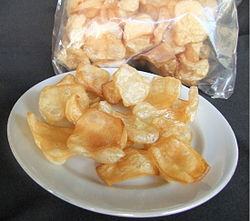Krupuk kulit
 Krupuk kulit | |
| Alternative names | karupuak jangek (Minangkabau) dorokdok (Sundanese) rambak (Javanese) |
|---|---|
| Course | Snack and main course |
| Place of origin | Indonesia[1] |
| Region or state | Nationwide |
| Serving temperature | Room temperature |
| Main ingredients | Cattle skin (cow or water buffalo), diced, sun dried, and fried in coconut oil |
Krupuk kulit (Javanese: rambak; Sundanese: dorokdok; Minangkabau: karupuak jangek, lit. 'skin crackers') is a traditional Indonesian cattle skin krupuk (cracker).[2] It is traditionally made from the soft inner skin of cattle (cow or water buffalo) which is diced and sun-dried until it hardens and loses most of its water content. The diced and dried skin are later fried in ample hot cooking oil until they expand similarly with bubbles and yield a crispy texture. This fried cattle skin is then sealed in vacuum plastic bags to ensure and prolong its crispiness.
History
[edit]Krupuk rambak or krupuk made from cow or buffalo skin, is the oldest-mentioned krupuk variant in ancient Java. According to a culinary historian, krupuk has been around in Java since the 9th or 10th century, written on the Batu Pura inscription as krupuk rambak, which still exists today in Javanese cuisine, usually in krechek, a spicy stew.[1]
Serving
[edit]
Krupuk kulit is often served as a crispy snack to accompany main meals. In Padang restaurants, they are often offered as a side dish for nasi padang or sate padang, and often served with kuah gulai seasoning. In Java, krupuk kulit is the essential ingredient for krechek, a krupuk kulit dish in spicy coconut milk stew.
Variations
[edit]Most of krupuk kulit sold in Indonesia are made from cattle skin, either cow or water buffalo (kerbau). However, in some areas with large non-Muslim populations such as Bali, Batak lands, and some Chinatowns in Medan and other cities, pork skin krupuk kulit is also available.[3] Compared to common cow skin crackers, kerupuk kulit babi (pork rinds) have a lighter colour and crumble more easily.[4] There is also a variant that uses frog skin as krupuk kulit kodok.[5]

See also
[edit]- Chicharrón
- Pork rinds
- Prawn cracker, a food of similar texture and appearance made of prawn and starch
- Krupuk
Notes
[edit]- ^ a b Wirayudha, Randy (31 August 2017). "Kriuk Sejarah Kerupuk". Historia - Majalah Sejarah Populer Pertama di Indonesia (in Indonesian). Retrieved 2020-10-11.
- ^ Abdul Lathief (May 14, 2012). "Kerupuk Rambak Potret Ekonomi Rakyat" (in Indonesian). Kompas.com. Retrieved May 17, 2014.
- ^ Mariska Tracy (17 April 2016). "Aroy Mak Mak: Kerupuk Kulit Babi Homemade" (in Indonesian).
- ^ "Membedakan Kerupuk Kulit Sapi, Kerbau, dan Babi". Sajian Sedap (in Indonesian). Archived from the original on 2017-02-23. Retrieved 2017-02-22.
- ^ "Setahun 500 Ton Kodok Hijau Diekspor, Rp 72 Ribu per Kilo". JPNN.com (in Indonesian). 12 January 2015.
External links
[edit]
